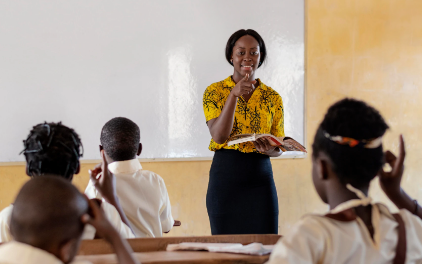South Africa is a country alive with possibility. Despite its unrivaled beauty, the dramatic landscapes, ocean views, rich history and culture, South Africa remains a largely unequal society. A reality perpetuated by the broken and unequal education system. The start of the new school year brings back into focus the looming gap that’s prevalent in the education sector in SA. Below, we explore this a bit further and discuss where students and educators can go from here.
The South African education system
In South Africa, every child has a basic right to education. It’s compulsory for children aged seven to 15 years to attend school and receive an education. The education system is divided into three levels, general education and training, further education and training, and higher education and training.
A 2020 report by Amnesty International reflected on the dire state of the education system. In rural areas and many schools in more urban neighbourhoods have crumbling infrastructure, classrooms are overcrowded, poor sanitation, no furniture, and learning materials arrive late to name a few. In extreme poverty cases, children walk kilometers daily and are forced to wade through rivers to get to school. These are just some of the factors that widen the inequality gap and result in poor educational outcomes at the end of the year of schooling.
“South Africa has one of the most unequal school systems in the world. Children in the top 200 schools achieve more distinctions in mathematics than children in the next 6,600 schools combined. The playing field must be levelled,” said Sheila Mohamed, Executive Director of Amnesty International South Africa.
Teachers leaving the country
Apart from issues of infrastructure, sanitation, and safety, educators in South Africa are leaving the country in droves.
For several years, South Africa has been seeing many skilled teachers leaving for greener pastures for the UAE and some Asian countries. A 2018 study found that the reason local educators were leaving for these countries was for financial, social, religious and the current political landscape in the country. The brain drain results from this low supply of experienced and highly skilled teachers in the system. Ultimately, schools are short staffed and classes experience overcrowding. Key factors that contribute to the quality of learning.
While this study was from five years ago, the numbers are continuing to rise today. And few people are interested in joining the field. Where does that leave scholars, the education system, and the country as a whole?
The looming gap in the education sector in South Africa
A 2022 publication reported on a study by the Jake Gerwell Fellowship that within the next 10 years, nearly half (45%) of teachers will be retiring. South Africa’s retirement age is 60. Roughly half of the teachers are in their 50s. These numbers do not bode well for the education sector.
Additionally, this crisis is further compounded by the number of educators leaving and the low uptake of people entering the field and choosing teaching as a career. Only 15 000 teachers are graduated annually. A figure below the 25 000 teaching graduates needed to maintain the supply-demand ratio. In fact, the study goes on to say that for about half of the current teachers, the field wasn’t their first or preferred career choice.
Impact of skills shortage in education sector
“Education is the most powerful weapon which you can use to change the world.” —Nelson Mandela
The impact on children, families, communities, cities and at a greater level, a country without teachers, TVET lecturers, and education support personnel is heavy. Without experienced and highly skilled teachers educating and imparting knowledge to learners, we could see the following impact:
- Compromises on qualifications and skills in hired teachers
- Reduced number of hired educators with the necessary subject specialism
- Inexperienced teachers
- Educators not a cultural fit
- Diminished scholar performance
- Poor classroom experience
A drop in the quality of education and the professionals to provide this human right to children will leave a devastating impact on the future of the world.
The solution
No one solution exists to the looming crisis. Instead, there are several steps and actions that can be introduced and taken to and restrict the widening gap in the education sector. Some of these are:
- Raise standards of education
- Government must work to invest in vocational training
- Investment in digital infrastructure for digital learning that will aid and improve quality of learning
- Partner up with private sector to assist public school systems to bring in resources where they are lacking
- Allow private sector to innovate
- Upscale and upskill teachers
- Government must improve teacher training and reduce administrative tasks they are bogged down with
- Pay education personnel well to motivate them to stay in the country and not seek higher salaries outside the country
- Improve teacher status to encourage higher enrolment in teacher training degrees and courses,
- Invest in training programmes for secondary school leavers
- Create a supportive environment for personnel
- Improve infrastructure, salaries, education budget
- Improve access to quality education for all
As it stands and if the gap continues to widen, this will hamper our economic growth and development plans. A poor education system and a broken sector will keep people in a vicious poverty cycle. All will, in the long run, have a positive impact on the country’s economy and perhaps begin to reduce the gap that’s growing in the education sector.
If you’re interested in pursuing a career in education, the best and first place to start is with a personality assessment. This short and expertly designed personality assessment will guide you in better understanding your strengths and weaknesses. Upon completion, you’ll receive a list of recommended courses to get you skilled and ready for the workplace.
If teaching runs through your blood and education field you want to get back into, update your resume with our free resume builder tool. Let’s all come together and see how we can stand in the gap, meet the need, and help build our country’s future leaders.










